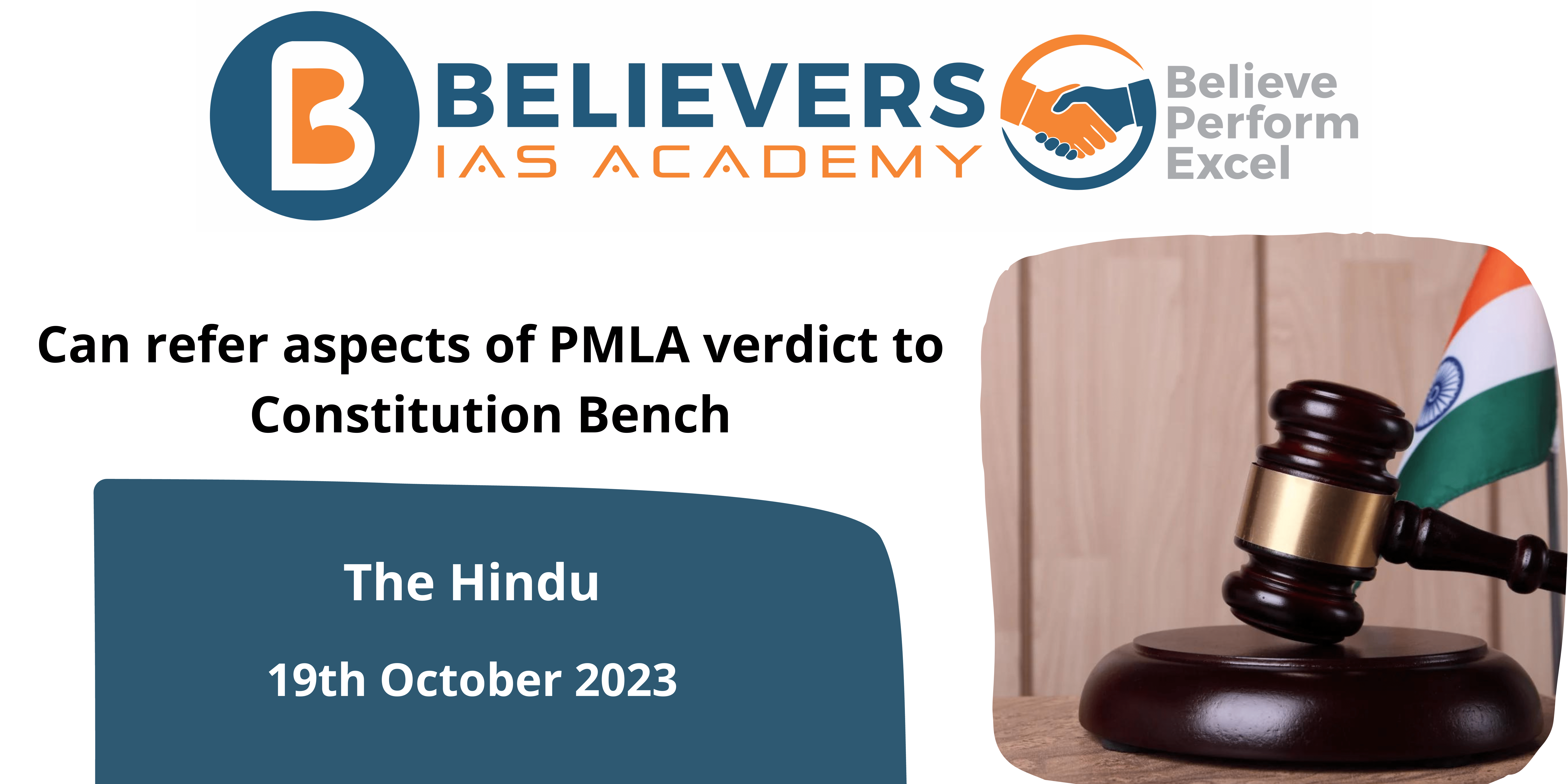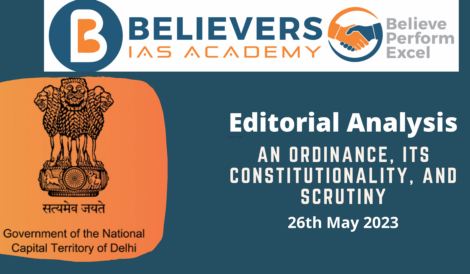Can refer aspects of PMLA verdict to Constitution Bench
Context :
On Wednesday, a three-judge panel led by Justice Sanjay Kishan Kaul said that it could refer to a Constitution Bench on any matter pertaining to the Prevention of Money Laundering Act (PMLA), which was affirmed by the Supreme Court in July 2022.
What is the Prevention of Money Laundering Act(PMLA)?
The Prevention of Money Laundering Act, 2002 (PMLA) is a tool of legislation in India aimed at preventing money laundering and confiscating property derived from money laundering.
What are the objectives of the PMLA?
- Prevent and Control Money Laundering: The PMLA’s main goal is to stop and manage money laundering in India.
- Confiscation and Seizure of Proceeds: The statute permits the property acquired through the proceeds of money laundering to be confiscated and seized.
- Address Money Laundering Concerns: The PMLA is intended to handle several money laundering-related concerns in India.
What are the salient features of the PMLA?

- Penalties for the Laundering of Money:
-
-
- Penalties for those found guilty of money laundering are outlined in the PMLA.
- Penalties include harsh incarceration, usually for a period of three to seven years. On the other hand, the maximum sentence for crimes covered by certain laws, such as the Narcotic Drugs and Psychotropic Substance Act, is ten years.
-
- Power to Attachment:
-
-
- Property thought to constitute the “proceeds of crime” may be temporarily attached by the Director or an officer designated by him.
- This attachment needs to be verified by an impartial adjudicating authority and is only valid for 180 days.
-
- Adjudicating Jurisdiction:
-
-
- The Central government appoints the Adjudicating Authority as a body to decide whether properties that are seized or attached are implicated in money laundering.
- It follows natural justice principles and functions autonomously.
-
- Presumption in Inter-Connected Transactions:
-
-
- If one or more of the interrelated transactions in a case of money laundering are shown to be involved in the money laundering scheme, the remaining transactions are assumed to be a part of this network.
-
- The burden of Proof
-
-
- If there is a charge of money laundering, the accused must demonstrate that the purported proceeds of the crime are, in fact, legitimate assets.
- The defendant bears the burden of proof.
-
Which is the agency tasked with handling the Financial malpractices?
- A government organization called the Financial Intelligence Unit – India (FIU-IND) is in charge of gathering, processing, examining, and sharing data about allegedly suspicious financial activities.
- To prevent money laundering and related financial crimes, FIU-IND collaborates with national and international intelligence and enforcement organizations.
What are the criticisms faced by the PLMA?
- The PMLA has faced criticism for its low conviction rate, which is less than 0.5% according to data shared in July 2022.
- Critics argue that the PMLA may be misused to target political rivals or dissenters and that the process itself can be used as a form of punishment.
- Scholars and activists have been targeted under the PMLA, raising concerns about freedom of speech.
What is the recent development in the PLMA Act?
- In a recent hearing, the Indian Supreme Court considered sending some sections of the Prevention of Money Laundering Act (PMLA) to a Constitution Bench, a bigger bench of the court that hears cases with important constitutional and legal issues.
- Context of the Case:
-
-
- The issue centres on a ruling rendered by the Supreme Court in the Vijay Madanlal Choudhary case on July 27, 2022. A few fundamental PMLA modifications were affirmed by this ruling.
- These changes had given the Enforcement Directorate a great deal of authority and transferred the onus of proof from the prosecution to the accused.
-
- Objections to the verdict:
-
-
- More writ petitions were filed at the Supreme Court as a result of unhappiness and worries about the effects of the PMLA revisions.
- These petitions questioned how the PMLA affected constitutional mandates, legal processes, and individual liberty.
-
Conclusion
In conclusion, this move demonstrates the Supreme Court’s readiness to examine and maybe reevaluate particular provisions of the PMLA’s legal code in response to petitions and worries about the legislation’s possible effects on Indian judicial processes and individual liberties. The outcome of this legal action will probably become clearer after the hearing on November 22.




